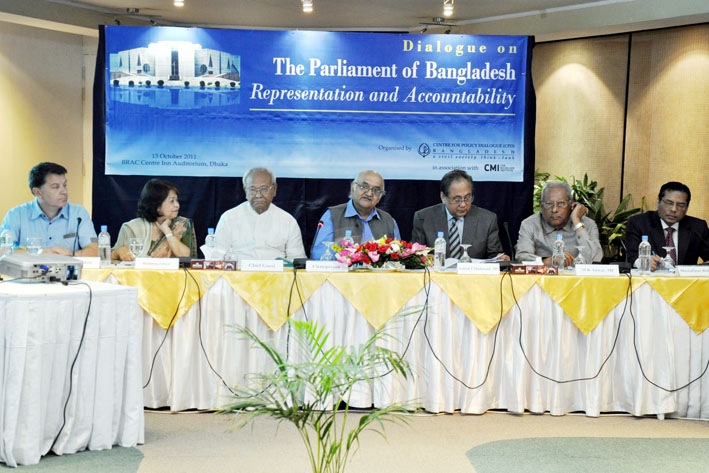CPD in association with Chr. Michelsen Institute (CMI), Norway organised a dialogue titled National Parliament of Bangladesh: Representation and Accountability on 13 October 2011 at the BRAC Centre Inn Auditorium. Professor Rounaq Jahan, Distinguished Fellow, CPD and Dr Inge Amundsen, Senior Researcher, CMI jointly prepared a paper which was presented at the dialogue to initiate the discussion. The dialogue was chaired and moderated by Professor Rehman Sobhan, Chairman, CPD.
The paper conceptualises representation as the key role of parliament through representation of popular will, social diversity and constituency. The second key role is accountability of the MPs to the electorates and the third role is to holding the executive branch of the government accountable. Professor Jahan observed that as MP’s electability depends upon his/her ability of representing the constituency, top priority has been given to development works in the locality. MP’s annual allocation for development coupled with his/her gatekeeper role in expenditure of public sector benefits raise scopes for corruption and nepotism. She informed that current parliament is doing better than the previous ones with more than 18 bills being passed in one session which also means less scope for debate and deliberation in the house.
Professor Jahan suggested for the neutrality of Speaker which can be ensured by following the British model (resigning from party and re-electing as Speaker) or election of Speaker by all party consensus. Echoing the suggestion of Dr Amundsen, she voiced the necessity of electing the head of the financial committees from opposition members. She also suggested the amendment of Article 70, engagement of civil society and citizens in the budget work for technical support and transparency, and formal procedures of involving opposition party in parliamentary proceedings.
Dr Amundsen posited a number of good practices around the globe including Open Budget Index from South Africa, shadow cabinet from Uganda, and white paper for policy formulation from Norway.
Chief Guest of the Session, Hon’ble Deputy Speaker Shawkat Ali, MP expressed his disappointment for the lack of debates within the house. Mr Suranjit Sen Gupta, MP opined that the major parties had contributed to the ineffectiveness of the parliament through boycott. He identified intolerance, centralisation of power and confrontational politics as the dominant trends of political culture of Bangladesh hindering the democracy. Barrister Anisul Islam Mahmud, MP highlighted the need for strengthening the voice of the civil society to exert pressure on government on different issues.
In the open discussion, participants strongly criticised Article 70 for imposing strict party control on the MPs and restricting their freedom of expression, and demanded its amendment.


